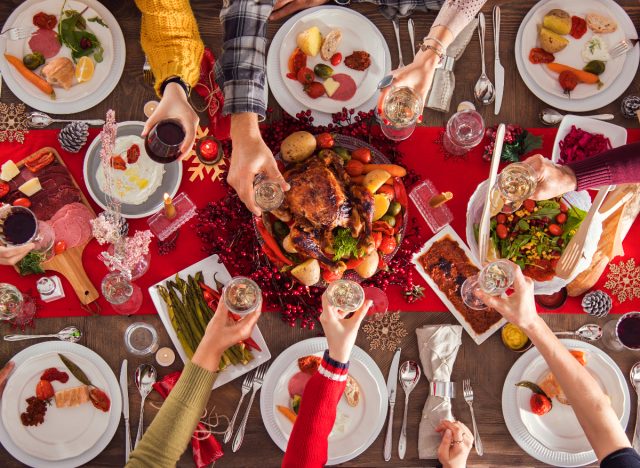Holiday Eating & Drinking Habits Can Lead to More Fatal Heart Attacks

The end-of-the-year holidays may be a time to get together with friends and family while celebrating in various joyful ways. That might include indulging in delicious meals, tempting desserts, and perhaps more than just a few glasses of wine or seasonably themed cocktails. While tasty treats and boozy beverages may be part of the holiday fun, they can also lead to more fatal heart attacks, according to the American Heart Association.
The AHA points to three studies that confirm the increased risk of deadly heart attacks around the holidays. The first, published by Circulation, found that more fatal heart attacks happen on Christmas Day (December 25), while December 26 was found to be the second most fatal day when it comes to heart attacks, followed by New Year’s Day (January 1).
Although some may assume that the colder weather is a major factor when it comes to deadly heart issues, a second study in Circulation found a significant increase in the number of fatal heart attacks around the holidays in warmer areas such as Los Angeles County, with more heart attacks happening in December and January compared to the summer months and early fall.
A third study published in the Journal of the American Heart Association backed up these findings with results from New Zealand where the holidays occur during the warmer summer months.
“The holidays are a busy, often stressful, time for many of us. Routines are disrupted; we may tend to eat and drink more […] We also may not be listening to our bodies or paying attention to warning signs, thinking a trip to the doctor can wait until after the new year,” noted American Heart Association Chief Clinical Science Officer Mitchell S.V. Elkind, M.D., M.S., FAHA.

“It’s important to accentuate the importance of proper diet and stress management techniques to reduce risk of CVD and serious cardiac events during the winter holidays,” Kiran Campbell, RD, tells Eat This, Not That! “And of course, do not brush off any potential warning signs of heart issues. If you’re having any chest pain, shortness of breath, lightheadedness, or pain in your upper body, you should talk to your doctor to help evaluate what could have caused these symptoms, so not to make them worse.”
Campbell also has some tips on how to take part in the holiday fun without increasing the risk of heart issues.
“There are several things you can do to prevent a cardiac event during the holiday season while still enjoying the seasonal food and drinks,” says Campbell. “For example, try not to overindulge in anything, whether it be eating sweets, high-fat or sodium foods, or alcoholic beverages.”
“Practicing moderation is something many people need to work on. And many also aren’t aware of what a standard serving size is for specific foods and even alcohol,” explains Campbell. “But educating yourself on this knowledge could be the very factor that prevents you from suffering a heart attack this season.”









